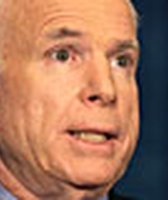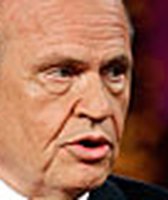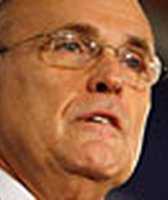Stand up for the facts!
Our only agenda is to publish the truth so you can be an informed participant in democracy.
We need your help.
I would like to contribute
SUMMARY: Fred Thompson has been consistent — though not perfect — on issues of federal power over states. But it sometimes comes at the expense of conservative ideals.
WASHINGTON – Fred Thompson is casting himself as the conservative's choice for president. The question is, whose version of conservatism is it?
In explaining his opposition to certain positions considered sacrosanct to the Republican Party's conservative base, Thompson, a former U.S. senator from Tennessee, describes his views as federalist and calls himself an old-school conservative whose philosophy was once mainstream for the GOP but in recent years has been squeezed out.
"I've cast a couple of 99-1 votes. I was the '1' during my career up there," Thompson told a crowd in Sioux City, Iowa, on Sept. 7, 2007. "My staff went nuts, you know, said this is the ruination of everything. I said, 'No, no, no, we'll just put out a little statement and explain this is just Fred being Fred.'"
And it's true. As a senator from 1994 to 2003, Thompson was the lone dissenter on several popular bills, amendments and resolutions that asserted federal power over traditionally state functions, Senate records show.
In 1997, he was the lone "nay" vote against a bill called the Volunteer Protection Act, which exempted Good Samaritans from being sued. In 2000, he was the only senator who voted against a resolution "encouraging local schools to insist on zero-tolerance policies towards violence and illegal drug use."
In 2001, he offered the only "nay" on an amendment to the No Child Left Behind Act that shielded teachers from civil liability.
He also voted against a bill to mandate national drunken-driving standards and opposed a bill to ban guns in school zones.
"I don't think the federal government ought to be federalizing something that's been under the state purview for 200 years," Thompson said to applause in Sioux City. "Give me a good reason why, when the federal government... can't get its own act together, why it ought to be taking on these other things in order to get a press release and a headline? ... That's not the right thing to do."
But he wasn't perfect.
As a senator, Thompson fell off the federalist wagon in at least one big way: supporting President Bush's signature No Child Left Behind Act of 2001, which sets federal standards for local schools. Conservatives also complain about his support for the Bipartisan Campaign Reform Act of 2002, known as McCain-Feingold, though whether this constitutes a breach of federalism is debatable. By capping political contributions and restricting ads by interest groups, conservative activists say McCain-Feingold amounts to censorship, and they note that states have traditionally managed elections.
Roger Pilon, director of the Center for Constitutional Studies at the libertarian Cato Institute, said Thompson deserves criticism for those votes, but they weren't the norm.
"He took a principled approach to federalism," Pilon said. "Not an approach that reads federalism as federal-state partnerships, but real federalism that tips power against power, as Madison described it, in order to protect individual liberty."
The intersection of Thompson's Senate record with his campaign to woo Republican primary voters puts him squarely in the midst of an ideological tug of war within the conservative movement.
His leave-it-to-the-states approach could be attractive to moderate or old-school Republicans disenchanted with the selective conservatism that has come to define Republican politics in Washington. But it also may put him at odds with social conservatives who have come to view power in Washington as a means of addressing moral or social issues nationwide.
This intraparty debate has steadily sharpened since the historic 1994 Republican takeover of Congress. Until the Democrats recaptured Congress last fall, President Bush and congressional Republicans had spent the past six years trying to usurp state authority in the name of morality on a variety of issues, from gay marriage to Oregon's physician-assisted suicide law to the medical use of marijuana use in California.
In spring 2005, unhappy with the decisions of Florida's courts, the Congress and President Bush pushed through Terri's Law, allowing federal review of the case of Terri Schiavo, the brain-damaged woman from Pinellas County enmeshed in a right-to-die dispute between her husband and her parents. More recently, the Bush administration has refused to grant requests by California, Florida and several other states to institute tougher standards for vehicle pollution.
Pilon, who held several senior posts in the Reagan administration, said the trend began under President George H.W. Bush and has continued under his son.
"The Bush administrations and those Republican congresses have changed the terms of the debate, from limited government to secure individual liberty to – how can I put it? – big-government conservatism – government in service of conservative interests," he said.
As he campaigns in early primary states like Florida, New Hampshire and South Carolina, Thompson is sure to face more questions from voters, particularly social conservatives, about how his approach to limited government would affect their issues if he wins the White House.
His philosophy generally puts him on the right side of some conservative red-meat issues, such as gun control and state attempts to regulate access to abortion. But on others, not so much.
Should Congress have intervened in the Schiavo case, a high-water mark for the political influence of national evangelical leaders? Thompson believes not, campaign spokesman Jeff Sadosky said. "This sort of decision is for the family to make under Florida law."
Should Congress again attempt to mandate damage caps and other limits on medical malpractice reform? No, Thompson says. Though a popular conservative cause, he says malpractice suits belong in state courts. If states have a problem with malpractice premiums and doctor shortages, then states should change their own systems, as California has.
Should Congress pass a constitutional amendment that would ban same-sex marriage? No, Thompson says. States have always set their own rules regarding marriage, and should. Instead, he has said recently, Thompson would favor an amendment allowing states to refuse to recognize same-sex marriages consecrated in other states.
"It's a smaller-government, authentically conservative way of addressing an issue that is becoming more of a challenge as activist judges play a larger role in policymaking," Sadosky, his campaign spokesman, said.
As Thompson tries to make his case, it is worth noting that his top opponents face their own challenges with the conservative GOP base. Former Massachusetts Gov. Mitt Romney, who said he also would have opposed congressional intervention in the Schiavo case, has been criticized for changing his views on abortion and gay marriage.
Former New York Mayor Rudy Giuliani supports legal abortion, while Arizona Sen. John McCain has clashed with national evangelical leaders. He's also been criticized for opposing the extension of certain tax cuts while the nation was at war.
As for Thompson, Sadosky said, "Where he stands on issues are not a result of election-year conversions on any issue, and I think voters will recognize that quickly and support the principled leadership that is driving it."
Our Sources
Roll Call Votes
Volunteer Protection Act Passed, 99 to 1. Thompson voted no, May 16, 1997
Vote to strike a portion of a tax bill on tax incentives encouraging home ownership and charitable giving Failed, 98 to 1, Thompson voted aye, April 2, 1998
Amendment encouraging "local schools to insist on zero tolerance policies towards violence and illegal drug use" Passed, 96 to 1. Thompson voted no, March 2, 2000
Teacher Liability Protection Amendment to No Child Left Behind Act of 2001 Passed, 98 to 1. Thompson voted no, May 9, 2001











































